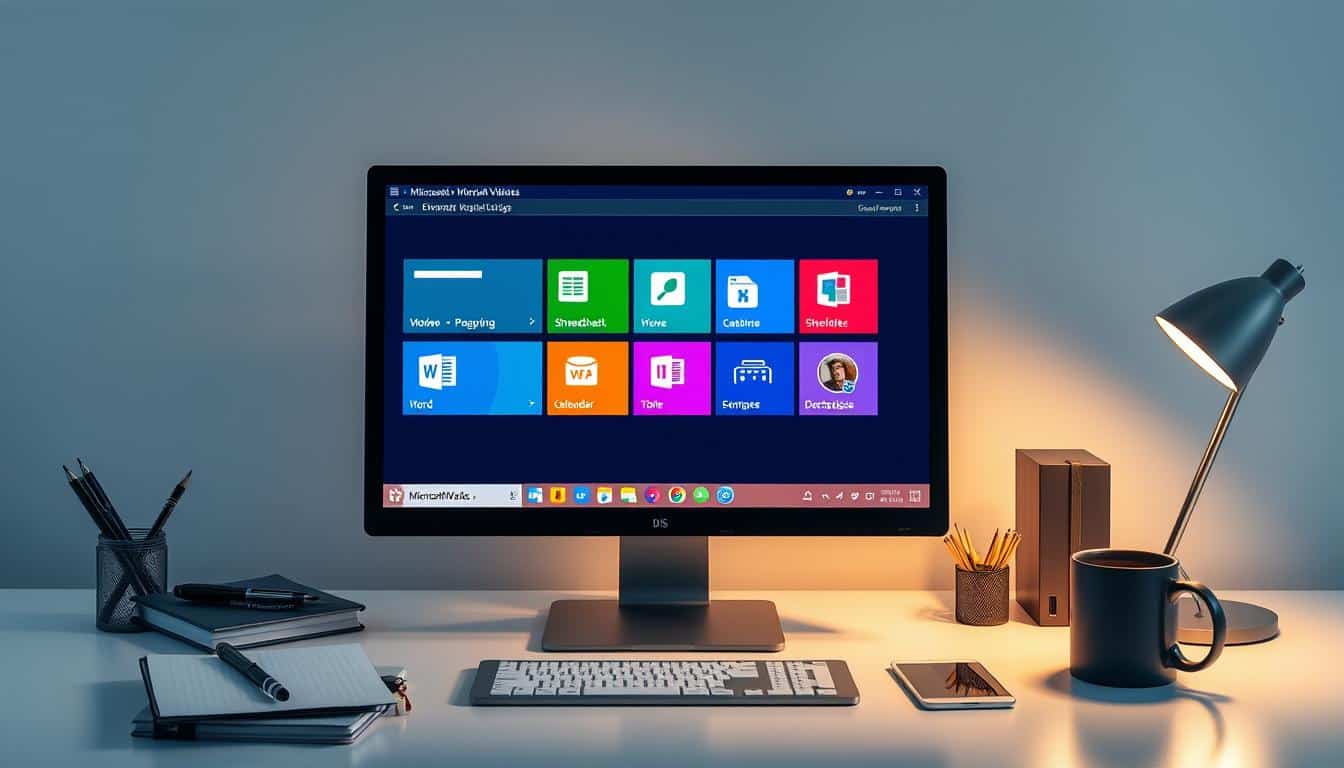
01 Oct Microsoft Works: Productivity Software Simplified
Welcome to the world of Microsoft Works. This unique productivity software fills your basic office needs with outstanding efficiency. It includes word processing, spreadsheet management, and basic database functions.
By combining these key features into one easy-to-use platform, Microsoft Works makes being productive simple. It’s great for small businesses and personal projects. Its straightforward design helps you handle your work smoothly, focusing on what’s important.
Key Takeaways
- Microsoft Works is an all-in-one productivity software solution.
- The suite includes tools for word processing, spreadsheets, and databases.
- Its user-friendly interface is ideal for small business and personal use.
- Microsoft Works helps streamline everyday office tasks efficiently.
- Easy accessibility makes it suitable for users without extensive training.
Introduction to Microsoft Works
Microsoft Works is an easy-to-use option for people looking for efficient office software. It helps streamline everyday tasks. It mixes important functions like text editing, spreadsheets, and managing databases. All of these are in one easy-to-navigate package. First coming out in the early 90s, Microsoft Works has changed to fit user needs. It aims to be simpler than bigger options like Microsoft Office.
Overview of Microsoft Works as an office software
Microsoft Works is known for its simple interface. It lets users do common tasks without feeling overwhelmed. It’s made for home and small business users who need basic tools. These tools help with making documents, organizing data, and communicating. The design is so user-friendly that moving between features is a breeze. Whether writing letters or managing budgets with spreadsheets, tasks are done without hassle.
Key features that simplify productivity
Microsoft Works has features that make being productive easier:
- Customizable templates for making documents quickly.
- Integrated help options for when you’re unsure how to proceed.
- Streamlined text editing tools for polished documents.
- Easy spreadsheet tools for data management, no complex formulas needed.
- Database solutions for effective information tracking.
These features greatly improve productivity. They let you focus more on work and less on figuring out complex software. Microsoft Works combines essential tools so completing both personal and professional tasks is easy. It’s perfect for those valuing efficiency1.
The Components of Microsoft Works
Microsoft Works has three key parts: the word processor, the spreadsheet app, and database tools. Together, they offer a full set of tools for different tasks. They cater to various needs, making work easier.
Understanding the word processor
The word processor in Microsoft Works is easy to use for making and changing documents. It has spell-check, grammar help, and simple ways to format your work. So, you can make documents that look professional with little effort. It’s great for people who aren’t tech-savvy, boosting productivity.
Exploring the spreadsheet capabilities
The spreadsheet app helps you sort and look at data. You can do math, use formulas, and make charts that catch the eye. It’s perfect for tasks that need a lot of number work, making your work smooth.
Using the integrated database tools
With Microsoft Works, there’s no need for separate database software. You can keep and handle lots of data easily. It’s simpler to track important stuff. This means you can use your data better, keeping everything from contacts to big data sets in order.
Document Creation Made Easy
Microsoft Works makes creating documents easy and productive. Users find it simple to reach their goals. Clear workflows and efficient tools let you craft professional documents fast.
Step-by-step guide to creating documents
Start your document with a blank page or choose from various templates. Templates help boost your productivity. They are great for reports, resumes, and letters.
Every step, from formatting to layout changes, is made simple by the software. This lets you concentrate on your content. You won’t have to fuss over technicalities.
Utilizing templates for efficiency
Templates make creating documents faster and easier. They save you time and keep your documents looking uniform. With professional designs ready to use, you won’t start from zero. This boosts your productivity and lessens your workload.
Microsoft Works: A User-Friendly Productivity Suite
Microsoft Works is easy and functional for everyone, from beginners to pros. Its easy-to-use interface boosts your work speed. You don’t need to know a lot to use it well.
The layout makes things easy to find, helping you get work done fast. It’s made to help you do more with less effort.
Benefits of a simplified interface
Microsoft Works’ simple design helps users a lot. It’s easy to learn and makes work go smoother. You won’t get lost in too many features, which makes working better.
Compatibility with different file formats
Microsoft Works also works well with many file types. It lets you share documents easily, keeping work flowing. This is great for teams using different software.
Comparison with Other Office Software
Looking at different office software helps you understand what best meets your needs. Microsoft Works is perfect for individuals and small businesses by offering simple and budget-friendly tools. It focuses on basic features, making it easy to handle your work without confusion.
How Microsoft Works stands out among competitors
Microsoft Works is more affordable compared to Microsoft Office or Google Docs. It’s an all-in-one suite made for users who need simple features without the complexity of other software. You can learn how to use it quickly, which is great for managing work and life.
Pros and cons of using Microsoft Works versus other productivity tools
Every software has its downsides. Microsoft Works is great for easy access and saving money but lacks advanced features. If you need detailed document design or complex data analysis, you might look elsewhere. It boils down to whether its basic features are enough for your work goals.
| Feature | Microsoft Works | Microsoft Office | Google Docs |
|---|---|---|---|
| Cost | Affordable | Higher price | Free with limitations |
| Ease of Use | Very User-Friendly | Moderate Learning Curve | User-Friendly |
| Advanced Features | Limited | Extensive | Moderate |
| Collaborative Tools | Poor | Excellent | Good |
If saving money while boosting productivity matters to you, looking at these options is essential. Microsoft’s updates, like Copilot in OneNote, provide more tips for efficiency, which you can check here. In the end, pick what suits your work needs and desired features1.
The Role of Calculation Tools in Microsoft Works
Calculation tools are key for boosting productivity in Microsoft Works. They offer many functions that let users do simple to complex tasks. These features help overcome data management issues.
Overview of built-in calculation tools
Microsoft Works has calculation tools that make handling data a breeze. You can use formulas, reference cells, and check errors to organize and look into data well. The easy-to-use design means you don’t need a lot of training to get started.
Real-world applications of spreadsheets for data management
Spreadsheets are great for handling data across many tasks in Microsoft Works. They’re used for budgeting, planning, and project management. With them, organizations can make detailed financial reports, check sales, or track inventory. This helps in making smarter choices, which boosts productivity.
| Function | Description | Real-World Application |
|---|---|---|
| Addition/Subtraction | Basic arithmetic functions to total or calculate differences in data sets. | Budget calculations for personal finance tracking. |
| Percentage Calculations | Calculate percentages to evaluate parts of a whole. | Analyzing sales data or market share. |
| Conditional Formatting | Highlight cells based on specific conditions to identify trends. | Project tracking to monitor deadlines and milestones. |
| Data Visualization | Create charts and graphs for easily digestible data representation. | Presenting performance reports to stakeholders. |
By using calculation tools and spreadsheets in Microsoft Works well, you make your data management better. This ensures your projects are clear and accurate. In a world focused on data, these tools give you a big edge2.
Enhancing Your Productivity with Microsoft Works
Getting the most out of Microsoft Works means using its shortcuts and advanced features. You can quickly reach commonly used tools by customizing the toolbars. Learning keyboard shortcuts makes editing documents and moving around them much easier.
Tips for maximizing your efficiency
To boost your efficiency, try these tips:
- Utilize custom templates to speed up creating documents.
- Check out the integrated features for smooth work with text, spreadsheets, and databases.
- Make it a habit to review tasks and keep your workspace tidy.
Utilizing shortcuts and advanced features
Microsoft Works is packed with shortcuts to improve your productivity. These shortcuts cut down on the time you spend on routine tasks. For instance, you can easily format text, add images, or set up tables with a few keystrokes. Using advanced features, such as mail merge or teamwork tools, further boosts your efficiency.
Real testimonies from users
Many have praised Microsoft Works for its user-friendly interface that lets them focus on their tasks. They love how the software saves them time, helping meet deadlines and manage projects well. Users have found that setting up shortcuts and customizing their workspace greatly improves how they work. This lets them focus more on being creative and less on solving technical problems3
Transitioning from Microsoft Works to Modern Tools
Technology is always moving forward. Because of this, we need to move from Microsoft Works to newer tools. Users find problems like missing cloud support and teamwork features. Knowing these issues helps decide if it’s time to update.
Understanding the limitations of outdated software
Sticking with Microsoft Works can slow you down. It’s missing things that new software has, like working together in real time and saving files online. These gaps make it tough to handle projects and share details in a team.
Key considerations for making the switch
When changing to newer tools, think about a few major points. First, figure out which new tools fit your needs or your group’s goals. It’s also essential to move data smoothly so you don’t lose important stuff. Lastly, look into learning resources for the new programs to keep your work flow going strong.
Conclusion
Microsoft Works is great for those who need simple software for work. It has an easy-to-use interface and provides tools for writing documents, making spreadsheets, and keeping databases. This makes it a great all-in-one option for basic tasks and staying efficient. Yet, as technology grows, moving to newer software might be needed for those who want more advanced features.
Making the most of your work comes down to choosing the right tools for your needs. As people see how important it is to adjust to new tech, moving from Microsoft Works to new solutions is key. This move keeps you ahead and effective in the fast-evolving digital world. Changing isn’t just about being more efficient, it’s about being ready for the future of work software and making your workflow better.
In short, Microsoft Works is good for simple tasks, but staying up to date with software tech is key. Making the leap to new tools can boost your work and help you succeed in a demanding world. Knowing this and choosing wisely will help you keep improving no matter where you go4.





Sorry, the comment form is closed at this time.